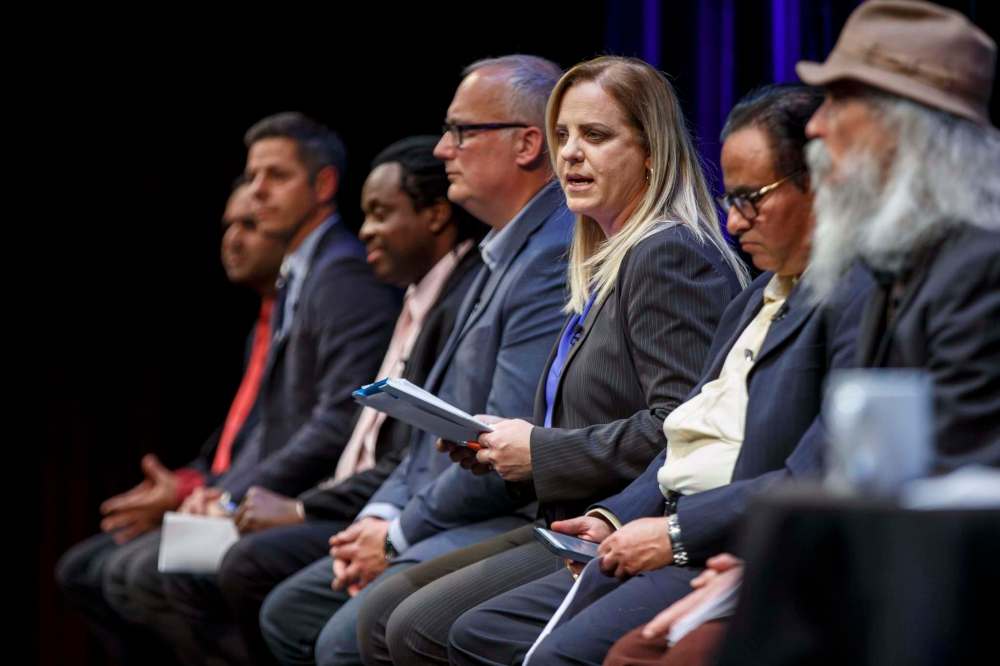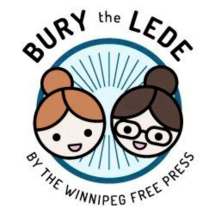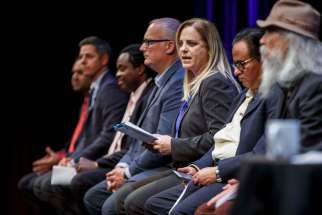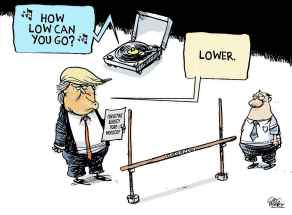Facts in short supply at mayoral forums
Read this article for free:
or
Already have an account? Log in here »
To continue reading, please subscribe:
Monthly Digital Subscription
$0 for the first 4 weeks*
- Enjoy unlimited reading on winnipegfreepress.com
- Read the E-Edition, our digital replica newspaper
- Access News Break, our award-winning app
- Play interactive puzzles
*No charge for 4 weeks then price increases to the regular rate of $19.00 plus GST every four weeks. Offer available to new and qualified returning subscribers only. Cancel any time.
Monthly Digital Subscription
$4.75/week*
- Enjoy unlimited reading on winnipegfreepress.com
- Read the E-Edition, our digital replica newspaper
- Access News Break, our award-winning app
- Play interactive puzzles
*Billed as $19 plus GST every four weeks. Cancel any time.
To continue reading, please subscribe:
Add Free Press access to your Brandon Sun subscription for only an additional
$1 for the first 4 weeks*
*Your next subscription payment will increase by $1.00 and you will be charged $16.99 plus GST for four weeks. After four weeks, your payment will increase to $23.99 plus GST every four weeks.
Read unlimited articles for free today:
or
Already have an account? Log in here »
Hey there, time traveller!
This article was published 05/10/2018 (2627 days ago), so information in it may no longer be current.
Mayoral candidate Jenny Motkaluk nailed it.
Late in Thursday night’s mayoral forum at the Centre Culturel Franco-Manitobain — presented by WinnipegREALTORS and the Winnipeg Free Press — an exasperated Ms. Motkaluk suggested the event needed “a fact-checker.”
It wasn’t an unreasonable request.

If there is one quality that links all of the mayoral debates to date, it has been candidates’ almost ritual abuse of fact.
Numbers are conjured out of thin air. Allegations are levelled without regard to reality. Statements of supposed fact are often little more than suppositions, theoretical musings or out-and-out fibs.
Truth is easily sacrificed in such debates, largely because it’s apparent that some participating candidates lack even the most basic understanding of city government. That hardly creates a breeding ground for fact-based exchanges.
This was never more obvious than during the portion of Thursday’s debate when each candidate was given an opportunity to direct a question to another candidate of their choosing.
When they were called upon, candidates were asked to identify which candidate would be the target of their query. This caused more than a few awkward pauses — if the candidates did not know who they wanted to question, it was even less likely they would know what they wanted to ask.
When questions were finally summoned, they ranged from the purely innocuous to dangerously misguided, occasionally verging on defamatory. The most obvious example of the commotion caused by certain candidates’ lack of familiarity with facts was the exchange that prompted Ms. Motkaluk to demand fact-checkers.
Several candidates attempted to level allegations that Ms. Motkaluk was in a conflict of interest because one of her brothers happens to own a local construction company that has secured road-renewal contracts from the city.
Candidate Ed Ackerman played the role of instigator, twice baiting fellow mayoral hopeful Venkat Machiraju — who had originally issued the conflict-of-interest allegation in a news release on Wednesday — into confronting Ms. Motkaluk. Candidate Don Woodstock got in on the exchange, demanding to know how voters could trust Ms. Motkaluk when there was such a clear conflict involving a family member.
The allegation showed all three candidates to be divorced from logic.
Having been awarded city contracts without a sister in the mayor’s office, Ms. Motkaluk’s brother has already proven he is worthy of the work. That pretty much eliminates any concern about a conflict should Ms. Motkaluk triumph in the election.
But as sympathetic as Ms. Motkaluk was in her pleas for factual accuracy, she herself seemed willing to manipulate facts.
Truth is easily sacrificed in such debates, largely because it’s apparent that some participating candidates lack even the most basic understanding of city government. That hardly creates a breeding ground for fact-based exchanges.
Ms. Motkauluk and candidate Tim Diack, a city police officer, repeatedly hammered incumbent Brian Bowman for the recent surge in meth-related crime. Both promised to make the city safer; Mr. Diack went further, saying that he would only serve one term as mayor, seemingly because he only needs four years to solve the meth crisis.
Leaders of local government cannot, on their own, “solve crime.” Crime — particularly the recent wave fuelled by meth addiction — is, at its heart, a mental-health challenge. And as such, it falls largely into the purview of the provincial and federal governments.
A mayor can certainly help, with an effective interdiction strategy that tries to interrupt the flow of meth into the city, but promising to solve the meth crisis from a perch in city hall is simply not realistic.
Fact-checkers might be a good addition to mayoral debates. But what civic politics also needs are mayoral candidates who have at least a passing familiarity with facts before they register to run.









